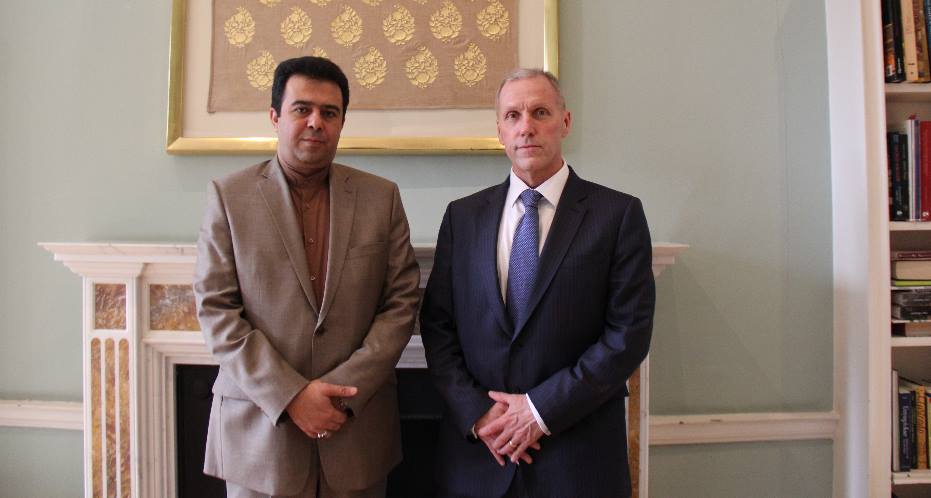Driving commercial and political engagement between Asia, the Middle East and Europe
Driving commercial and political engagement between Asia, the Middle East and Europe
Driving commercial and political engagement between Asia, the Middle East and Europe

After 10 years of isolation, Iran is now open for business, particularly for foreign investment from Europe, the Vice Governor of Economic Affairs of the Central Bank of Iran has said.
But Peyman Ghorbani said that whilst the private sector was showing great interest in entering Iran the Central Bank of Iran was “not satisfied” with the level of cooperation being shown by large banks in the UK and in some parts of Europe following the lifting of European economic sanctions in January this year.
European economic sanctions were lifted on 16 January following the implementation of the measures detailed in the JCPOA (the Joint Comprehensive Plan of Action) which had been agreed in July last year. Western banks still remain cautious of investing in the country as US trade embargos remain in place and financial transactions are still not allowed through US financial systems.
In an exclusive interview at Asia House this week during his trip to London Mr Ghorbani pointed out that lots of trade missions from all over the world had come to Iran recently. But he said: “We are not satisfied with the level of cooperation with large banks in the UK and in some parts of Europe. Some of them are being overly cautious because of US sanctions. We have done what needs to be done and we have also done what needs to be done to provide enough comfort to big banks. We think this is something that the private sector and banks have to solve together. We have seen good cooperation from Italian and French and Swiss banks so some of the banks are being more realistic,” he added.
“I think the banks have a duty to the private sector in the UK,” he added.
He said that now was the right time to invest in Iran. He said there had been some inflows of capital to the Iranian stock market already which had been offering “very good and stable returns so far” so for foreign investors coming to Iran “they could get a very good return – easily 20 per cent,” he said. “This is a unique opportunity and those companies that are aware of it are taking action,” he said. He added: “It’s very important to be clear about the risks – there are some difficulties in Iran. We know the problems and we have the right solutions but we think the banks are being overcautious. The private sector is much less cautious.”
He said Iran, which is the third largest oil producer in OPEC (Organisation of the Petroleum Exporting Countries) welcomed foreign direct investment (FDI) from all countries including the UK and Iran did not hold any grudge against the UK for previously enforcing sanctions. “We are open to all countries and we welcome all investors but especially those that want to transfer advanced technology to Iran,” he stressed.
Industries in Iran of potential interest to European companies include finance, civil aviation and the automobile industry, he said. Iran also ranks second in the world in natural gas reserves and fourth in proven crude oil reserves.
In the 26 February elections, the first since the nuclear deal was struck, for the Parliament and the Assembly of Experts (the body in charge of selecting the Supreme Leader’s successor), moderates and reformists performed well, though a second round of the parliamentary elections still must take place in April.
“I think the recent elections give a message about political stability in Iran and the maturity of the Iranian people. They demonstrated that compared to the rest of the region Iran is a mature and stable democracy,” he said.
When asked if changes were already visible in Iran following the lifting of European sanctions in January, he said: “The changes actually started at the beginning of Dr Hassan Rouhani’s administration [in August 2013] and the JCPOA has been a part of it from the beginning. Straight after his election he started political engagement with P5+1 (China, France, Germany, Russia, the United Kingdom, and the United States) to solve the nuclear issue and we started economic reforms at that time. So in the past two years we have done a good job of controlling inflation and foreign exchange stability.”
The Iranian Government has said that it wants to achieve 8 per cent GDP growth every year for the next five years under a new post-sanctions development plan, double the 4.34 per cent growth of 2014. Iran’s GDP growth rate in 2015 was below one per cent. The country is also targeting single-digit inflation post 2017. Inflation in 2015 stood at around 15.09 per cent.
“We have better prospects of achieving a high and sustainable growth rate in a non-inflationary atmosphere so we need low and stable inflation. We want to achieve high growth rates so we need good financing and cooperation with other countries and to attract FDI to the economy,” Mr Ghorbani said.
US$32 billion of Iran’s money has been frozen in foreign banks because of the sanctions imposed on the country. So what will the Government do with that? “These are our frozen assets,” he said. “We will use it to ensure external stability in the economy and make sure the foreign exchange is much more stable and use it to finance importers. We don’t intend to use it for consumer goods. We want to finance intermediate and capital goods to renovate our industries,” he added.
naomi.canton@asiahouse.co.uk
To discuss the 2016-2017 Budget and the outlook for the Indian economy KPMG India CEO Richard Rekhy; Partner at Clayton, Dubilier & Rice, Vindi Banga; and Arup Group COO David Whittleton will brief Asia House corporate members on Tuesday 22 March. Click here for more information.
